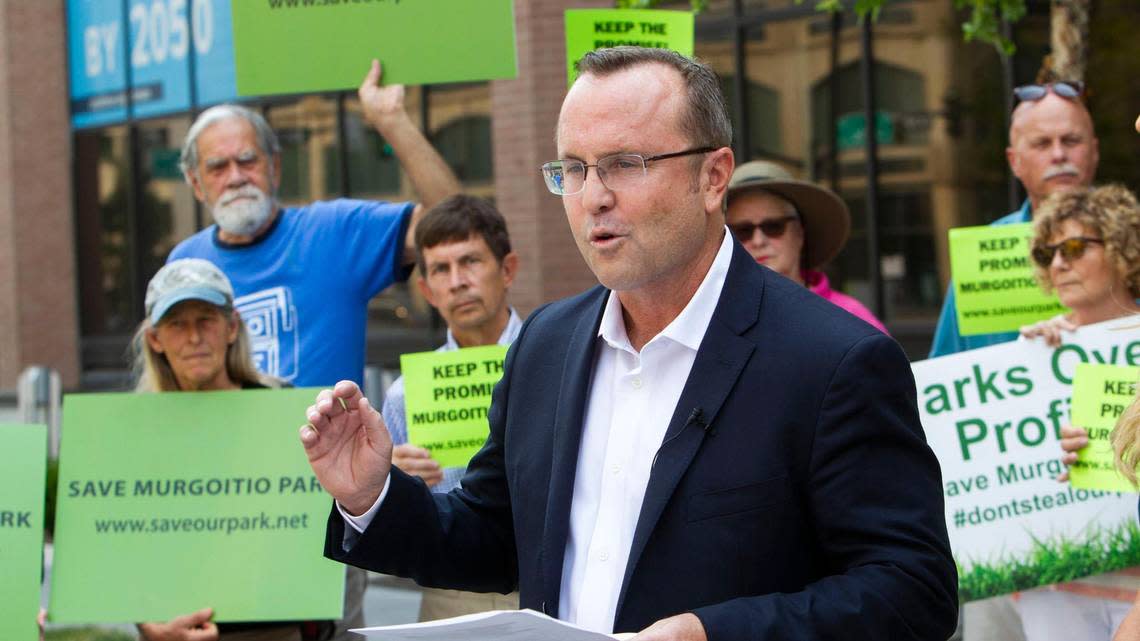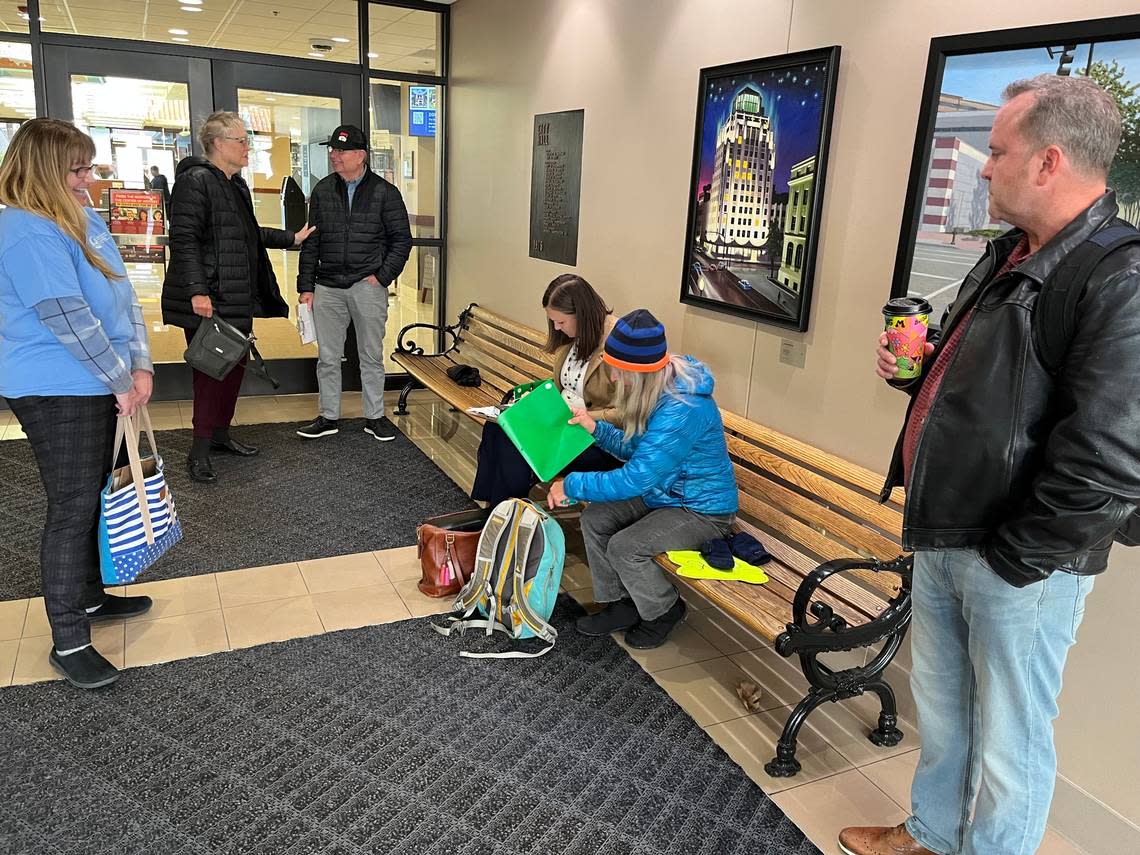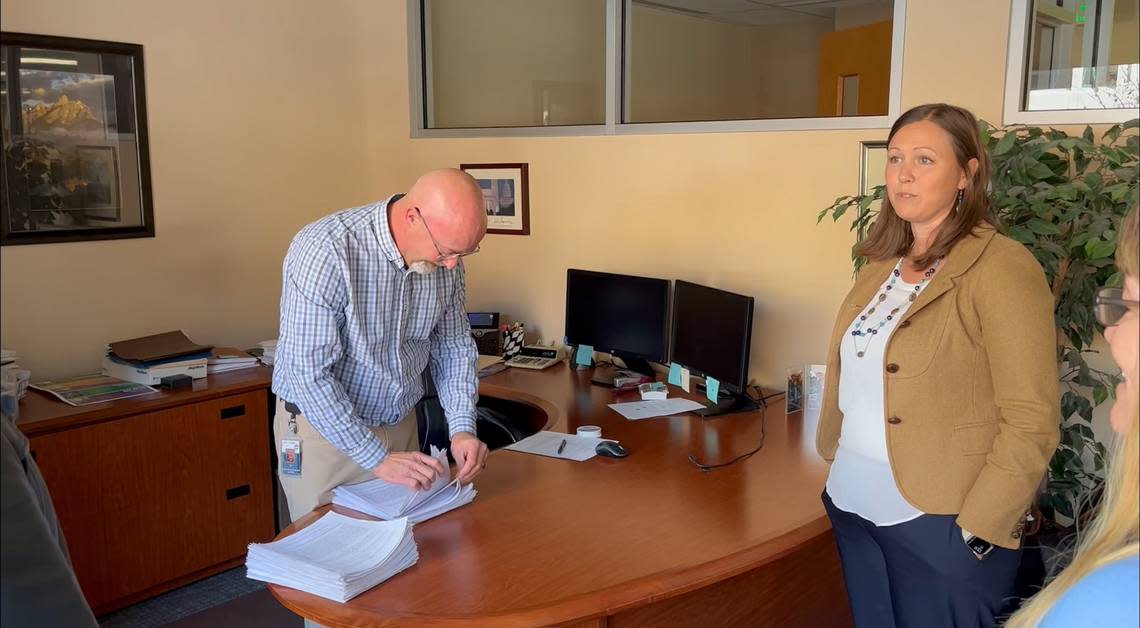A measure to protect parks could be on Boise’s November 2023 ballot. What to know
Three years ago, a grassroots effort dispatched Boise city leaders’ efforts to build a new library and allow the construction of a new stadium by successfully pushing citywide ballot measures, which required such projects to get voter approval.
Now, some of the same locals are pushing to extend a similar requirement for another type of development: parks.
A new citizens group, which calls itself the Boise Parks Association, has collected thousands of signatures for a new measure to protect park property. Under the proposed ordinance, Boise voters would need to approve any city plans to sell, trade, transfer, give or change the use of more than 5% any city property designated as a park or open space.
“I would not want to stay in between a neighborhood and the city coming after their parks, their Foothills Reserve open space and other public greenspace in Boise,” said Katie Fite, a director of the Boise Parks Association who was instrumental in getting the required signatures.
“People are fiercely protective,” Fite told the Idaho Statesman. “So this needs to get on the ballot.”
The effort follows city officials’ move last year to allow the development of a parcel, known as the Murgoitio site, that for years had been slated to be a park. The new initiative could prevent city officials from developing that land for housing, an idea floated last year.
The proposal is worded such that even the Murgoitio site — which is southwest of city limits — would need majority support from Boise voters to alter because it is city property.
Since last year, discussions within the city about the Murgoitio site have been on hold.
Citizens group submits signatures to Boise
The Boise Parks Association submitted a final batch of signatures to the Boise city clerk’s office earlier this month. The number of submitted signatures totaled about 10,500, said Aimee Russell, one of the group’s directors.
If most of the signatures are verified over the next two months by the Ada County clerk, the grassroots effort will have surpassed the minimum number needed to advance a petition, which this year was 6,823, Boise city staff members said. The minimum number of signatures needed is 20% of the number of votes cast in the previous general election.
“We’re immensely grateful for all of our directors and volunteers for all the hard work that went into gathering 10,365 signatures,” David King, one of the leaders of Save Murgoitio Park and another of the Boise Parks Association’s directors, told the Statesman as volunteers brought stacks of signed petitions to City Hall on Nov. 16, the deadline to submit signatures for the November 2023 ballot.

If enough signatures are verified to advance the petition as an ordinance, it will come before the council within 30 days, likely by mid-February. The council could either adopt the ordinance or not, in which case the proposal would go before city voters in the 2023 general election.
Boise City Council moves to restrict deeds
Boise leaders are also implementing their own plan to protect Boise’s parks.

Last year, Boise began to review all city parks and open spaces to assess the level of protection each property had, Doug Holloway, the Parks and Recreation director, told the City Council on Tuesday. While many parks were determined to have lasting protection, others did not have deed restrictions, which limit how property can be used. Even some large parks that spanned multiple parcels didn’t have deed restrictions on every parcel, Holloway told the council.
In all, the city plans to add a declaration of deed restriction and restrictive covenant to about 50 city parks and reserves by mid-January, Holloway said. Each resolution must be passed by the council.
At the Nov. 15 council meeting, protections were added to 10 parks, including Aldape Park, east of the Military Reserve, Cassia Park, on the Bench, and Cottonwood Park, in West Boise. Areas slated for protection include spaces like the Grove Plaza downtown.
“Boise is known for its love of parks and open space,” Maria Weeg, a city spokesperson, said in an email to the Statesman. “Since last October we have been actively evaluating all city-owned property to ensure its highest and best use and found the opportunity to provide the same legal protections throughout our parks and open space holdings as many of our larger parcels enjoy.”
Backers of the initiative and the city’s efforts are debating the merits of the two endeavors. Though the two efforts to protect local parks are happening at the same time, the ordinance from the ballot initiative would apply to more areas compared with the City Council’s plans, which involve restricting the deeds of dozens of city parks.
In a text message, Council President Pro Tem Holli Woodings said “the original filing of the initiative helped us realize how little protection our parks had.”
“It’s my understanding that this approach is much stronger than an ordinance, which can be repealed or amended at any time,” Woodings said.
Rob Lockward, an assistant city attorney, said the language in the deeds would make it difficult for a future council to undo the protections. But he added that it’s somewhat unclear how permanent the restrictions will be.
Council Member Patrick Bageant said the deed restrictions will be stronger than an ordinance, which could be repealed.
“The initiative process is never going to result in something that is as strong or as long-lasting,” he said. The deed restrictions will “give away some of the land-use rights so that it’s actually illegal to change the use of those properties. It can’t be done by any council regardless of whether they want to or not.”
He added, “we’re giving away the right to occupy these spaces, and we’re giving that right to the public and it will belong to the public forever, and nobody in the future will be able to do anything about that.”
But the group’s organizers say the city’s effort is incomplete, as it only applies to parks within city limits and wouldn’t go to a vote.
The voter initiative would apply to any park property owned by the city, Weeg said. That includes four additional park areas southwest of Boise not covered by the city’s work on restricting deeds: Murgoitio, Pearl Jenson, Fox Ridge and Wrigley.
Murgoitio contains 160 acres, stretching from South Maple Grove Road to South Cole Road, between West Victory and West Amity roads. Fox Ridge, more than 3 acres south of Lake Hazel Road, is just north of the city limit. Two additional parks, Pearl Jenson and Wrigley, are also undeveloped.
“We support what they’re doing,” King said. “But it doesn’t eliminate the need for voters to weigh in on these decisions. … We’re certain that this additional legal protection is necessary to preserve parks.”
King, an attorney, said that deed restrictions could also be lifted by the city sometime down the line.
Council member says Boise has ‘evolving needs’
King is one of the directors of Save Murgoitio Park, which has fought city officials’ proposed land swap of the property to a housing developer in exchange for open space in the Foothills, north of Boise.
Murgoitio Park’s 160 acres had been planned as an eventual city park since the 1990s. In the land swap plan, the city proposed leaving 7 acres of the area as a park, according to previous Statesman reporting.
In June 2021, Mayor Lauren McLean considered using the undeveloped site for housing, which was in short supply. After public outcry, McLean paused the city’s plans to annex and develop the area.
Bageant noted that residents of southwest Ada County had, over the last two decades, fought annexation into the city, which means they haven’t paid city development impact fees. A portion of those fees goes into the parks budget, which could have been used to pay for a park at the Murgoitio site had the area been annexed.

It is unclear how many votes in favor of the ordinance there are on the council.
Some council members have expressed concern that added restrictions on park land could handcuff the city years down the road in an unforeseen predicament. In an interview, Council Member Luci Willits told the Statesman that the council will have “robust discussions” before deciding what to do.
“I couldn’t say today exactly what I would do, but I’m learning as much as possible and want to make sure I’m informed about all the pros and cons,” she said, adding that if it does pass on the ballot, she would likely not vote to repeal it afterward.
Willits, who joined the council this year, also said she supports the city’s work on deed restrictions, especially as Boise grows quickly.
“I think that folks would be shocked that some of their most beloved parks didn’t have the best legal protection possible,” she said.
Council Member Lisa Sánchez told the Statesman in a text message that she appreciates citizen input on development and wants decision makers to carefully consider proposals that will affect current and future residents.
“As a municipality and a council, we have recently taken measured steps to address some of the concerns that the petitioners have brought forward,” Sánchez said. “I do think we need to be mindful of how any new policy may affect city leaders’ ability to address the evolving needs of our city.”
